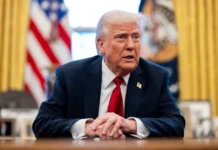There were a range of different but very hostile reactions to Daniel Patrick Moynihan’s 1975 speech at the United Nations, denouncing its “Zionism Equals Racism” resolution.
The British Ambassador to the United Nations, Ivor Richard, mocked him by saying that he was playing a cowboy in a Western. The PLO’s Observer to the United Nations, Zehdi Terzi, threatened to kill him. Later, when Moynihan was running for election to the United States Senate, he received a $1,000 check from a woman who said she would have doubled it had he not made such a ruckus about the resolution. Moynihan sent the check back.
The former U.N. Ambassador and long-serving United States senator’s efforts on behalf of Israel and against anti-Semitism are many. But the battle against the resolution has, deservedly, taken on a special status.
Moynihan had never been to Israel, but, as he noted, the resolution, “reeked of the totalitarian mind, stank of the totalitarian state.”
His outrage reflected his sense of common decency. Famous for his fine suits and elegant manner of speech, Moynihan demanded that those in his personal circle not only be people of character, but also people of civility, recognizing that these were important attributes in the formation of a worthwhile culture.
Thus, the resolution seemed to him not only brazenly immoral, but also a breach of standards. In taking on the U.N. resolution, he commenced a war. It would take 15 years to remove the stain, but in 1991, the resolution was reversed. And while this was the noble work of many men, it might not have happened save for the one.
Of course, Moynihan had been involved in other important fights. With regard to Soviet Jewry, whenever possible he met directly with leaders to discuss the cause, not passing the work off to aides. He may also have played the greatest role in establishing the idea that the United States should recognize Jerusalem as Israel’s capital.
“You are entitled to your opinion. But you are not entitled to your own facts,” he famously stated.
Throughout his life, Moynihan remained committed to the facts. As the run of recent books, articles, speeches and tweets about Moynihan suggest, his consistent defense of Israel will continue to inspire leaders in the years ahead.


























